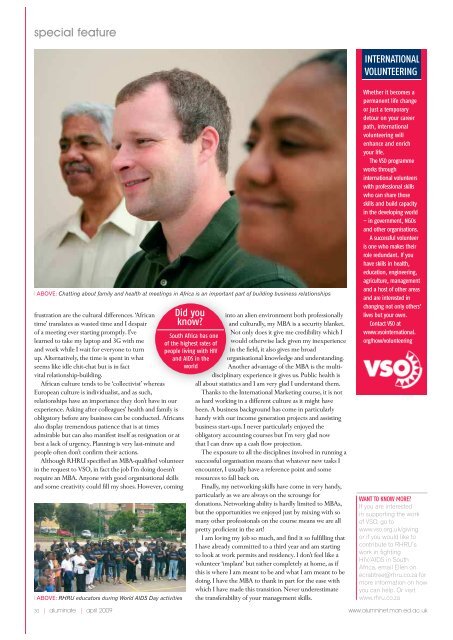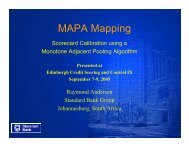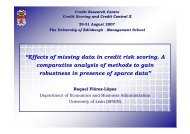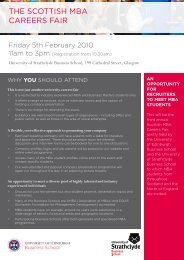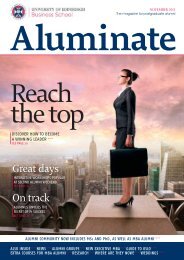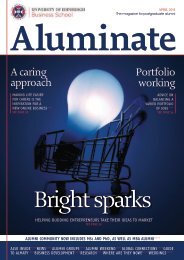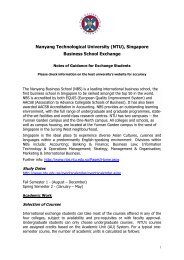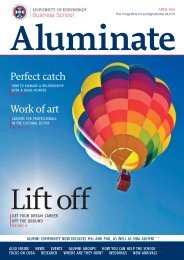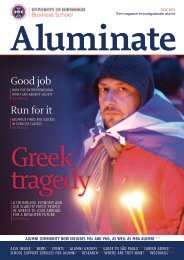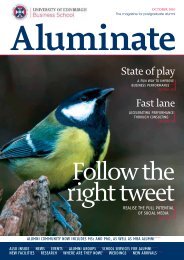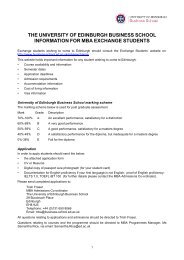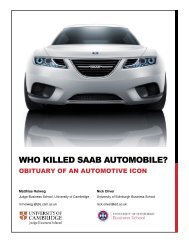to thewind? Caution - University of Edinburgh Business School
to thewind? Caution - University of Edinburgh Business School
to thewind? Caution - University of Edinburgh Business School
You also want an ePaper? Increase the reach of your titles
YUMPU automatically turns print PDFs into web optimized ePapers that Google loves.
special featurepeopleINTERNATIONALVOLUNTEERINGCrawford Allan believes it isimportant <strong>to</strong> take a calm, measuredand firm approach when facingconfrontation on the pitchA LIFE INMANY PARTS| ABOVE: Chatting about family and health at meetings in Africa is an important part <strong>of</strong> building business relationshipsfrustration are the cultural differences. ‘Africantime’ translates as wasted time and I despair<strong>of</strong> a meeting ever starting promptly. I’velearned <strong>to</strong> take my lap<strong>to</strong>p and 3G with meand work while I wait for everyone <strong>to</strong> turnup. Alternatively, the time is spent in whatseems like idle chit-chat but is in factvital relationship-building.African culture tends <strong>to</strong> be ‘collectivist’ whereasEuropean culture is individualist, and as such,relationships have an importance they don’t have in ourexperience. Asking after colleagues’ health and family isobliga<strong>to</strong>ry before any business can be conducted. Africansalso display tremendous patience that is at timesadmirable but can also manifest itself as resignation or atbest a lack <strong>of</strong> urgency. Planning is very last-minute andpeople <strong>of</strong>ten don’t confirm their actions.Although RHRU specified an MBA-qualified volunteerin the request <strong>to</strong> VSO, in fact the job I’m doing doesn’trequire an MBA. Anyone with good organisational skillsand some creativity could fill my shoes. However, coming| ABOVE: RHRU educa<strong>to</strong>rs during World AIDS Day activitiesDid youknow?South Africa has one<strong>of</strong> the highest rates <strong>of</strong>people living with HIVand AIDS in theworldin<strong>to</strong> an alien environment both pr<strong>of</strong>essionallyand culturally, my MBA is a security blanket.Not only does it give me credibility which Iwould otherwise lack given my inexperiencein the field, it also gives me broadorganisational knowledge and understanding.Another advantage <strong>of</strong> the MBA is the multidisciplinaryexperience it gives us. Public health isall about statistics and I am very glad I understand them.Thanks <strong>to</strong> the International Marketing course, it is notas hard working in a different culture as it might havebeen. A business background has come in particularlyhandy with our income generation projects and assistingbusiness start-ups. I never particularly enjoyed theobliga<strong>to</strong>ry accounting courses but I’m very glad nowthat I can draw up a cash flow projection.The exposure <strong>to</strong> all the disciplines involved in running asuccessful organisation means that whatever new tasks Iencounter, I usually have a reference point and someresources <strong>to</strong> fall back on.Finally, my networking skills have come in very handy,particularly as we are always on the scrounge fordonations. Networking ability is hardly limited <strong>to</strong> MBAs,but the opportunities we enjoyed just by mixing with somany other pr<strong>of</strong>essionals on the course means we are allpretty pr<strong>of</strong>icient in the art!I am loving my job so much, and find it so fulfilling thatI have already committed <strong>to</strong> a third year and am starting<strong>to</strong> look at work permits and residency. I don’t feel like avolunteer ‘implant’ but rather completely at home, as ifthis is where I am meant <strong>to</strong> be and what I am meant <strong>to</strong> bedoing. I have the MBA <strong>to</strong> thank in part for the ease withwhich I have made this transition. Never underestimatethe transferability <strong>of</strong> your management skills.Whether it becomes apermanent life changeor just a temporaryde<strong>to</strong>ur on your careerpath, internationalvolunteering willenhance and enrichyour life.The VSO programmeworks throughinternational volunteerswith pr<strong>of</strong>essional skillswho can share thoseskills and build capacityin the developing world– in government, NGOsand other organisations.A successful volunteeris one who makes theirrole redundant. If youhave skills in health,education, engineering,agriculture, managementand a host <strong>of</strong> other areasand are interested inchanging not only others’lives but your own.Contact VSO atwww.vsointernational.org/how/volunteeringWANT TO KNOW MORE?If you are interestedin supporting the work<strong>of</strong> VSO, go <strong>to</strong>www.vso.org.uk/givingor if you would like <strong>to</strong>contribute <strong>to</strong> RHRU’swork in fightingHIV/AIDS in SouthAfrica, email Ellen onecrabtree@rhru.co.za formore information on howyou can help. Or visitwww.rhru.co.zaCRAWFORD ALLAN (CLASS OF 1999) COMBINES A FULL-TIME JOB WITHPART-TIME REFEREEING. JANE CRAWFORD FINDS OUT WHAT THE BENEFITSARE AND HOW HE MAINTAINS THE ALL-IMPORTANT WORK-LIFE BALANCEOn the ballKeeping your eye on the ball is somethingwe all try <strong>to</strong> do in juggling our careersand home life, but in Crawford Allan’scase, it is closer <strong>to</strong> the truth than most.Working as a part-time pr<strong>of</strong>essional footballreferee for the Scottish Premier League onSaturdays as well as managing a full-time jobas a Senior Change Manager with RBS,achieving a work-life balance is vital <strong>to</strong> Crawford.There are many parallels between the two roles, and heis able <strong>to</strong> draw on what he has learned from refereeing <strong>to</strong>help in his day job, not least that he currently manages 25staff in his day job, and 22 on Saturdays on the pitch.Having previously worked as a management trainer,Crawford feels that there are many similarities betweenthis and refereeing. ‘The core skills and competencies arethe same, such as communication, influencing andinspiring,’ said Crawford. ‘I need <strong>to</strong> have confidence in myabilities and as with training, if facing a confrontation onthe pitch, it’s important <strong>to</strong> take a calm, measured and firmapproach, especially in such a highly charged atmosphere.’In terms <strong>of</strong> the qualities he needs <strong>to</strong> be a referee, heneeds <strong>to</strong> be a strong people manager and communica<strong>to</strong>r– with a quick ability <strong>to</strong> read people’s feelings and get afeel for the game. Knowing the law doesn’t make you agood referee, admitted Crawford. As with the MBA, it isall about knowing how <strong>to</strong> put the theory in<strong>to</strong> practice.Crawford believes that his involvement in refereeing hasDid youknow?Since Crawford became areferee in April 1991, hehas been appointed <strong>to</strong>five internationalcompetitionsa positive affect on his wellbeing andperformance at work. ‘It’s a bit <strong>of</strong> a release,and gives me an outside focus, helping me <strong>to</strong>de-stress,’ said Crawford.‘Given the intensity <strong>of</strong> each game, theconcentrated period <strong>of</strong> focus requires you <strong>to</strong>shut out what you see around you.’The refereeing is time consuming, with thecommitment <strong>of</strong> training sessions during the week,but he said that this has the added benefit as it keepshim focused at work rather than staying late.Crawford admits that there are sacrifices made by hisfamily but that it’s important <strong>to</strong> share the benefits withthem. For example, he tends <strong>to</strong> use the income fromrefereeing for weekends away,and if the refereeing takes himoverseas, then he tries <strong>to</strong> ensurethe family also enjoy thebenefits, such as a recent trip<strong>to</strong> Milan.So how does he cope withmanaging two jobs? ‘Settinggoals and targets is important,’said Crawford.‘And learn <strong>to</strong> say no when thediary is full. Accept you can’t doeverything and be everything <strong>to</strong>everybody.’Pictures: SNSpix.comCrawford tends <strong>to</strong> viewhis life in silos andargues that you have <strong>to</strong>accept that you can’tsucceed in everything.In his case, he couldhave aimed <strong>to</strong> be aWorld Cup Final refereeand a Managing Direc<strong>to</strong>rat work (in addition <strong>to</strong>being a good Dad andhusband). He hasaccepted that he can’treach all <strong>of</strong> those goalsand that instead, hesets small goals for each<strong>of</strong> his silos.‘I keep focusing onthe next small step ineach silo – you neverknow where you mightend up, and you won’tbe disappointed if youdon’t quite make theWorld Cup finals,’he said.An example <strong>of</strong> notbeing content withexisting goals, and <strong>to</strong>prove he is always onthe new lookout fornew challenges,Crawford has competedin a number <strong>of</strong> 10kraces. He also decidedhe needed an extrachallenge and he hasrecently progressed on<strong>to</strong>full marathons,including the London,Venice and New Yorkmarathons – all in thelast year.30 | aluminate | april 2009 www.alumninet.man.ed.ac.ukwww.alumninet.man.ed.ac.uk april 2009 | aluminate | 31


